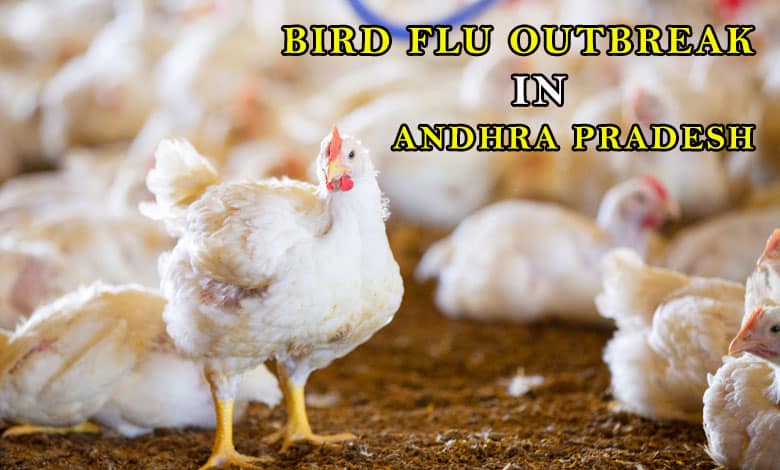Bird Flu Outbreak in Andhra Pradesh: Lockdown Imposed on Poultry Sector
A bird flu outbreak in Andhra Pradesh's East Godavari district has led to a lockdown on poultry sector movements in Peravali, Nallajarla, and Seethanagaram. Authorities have declared red zones, culled birds, and urged the public to reduce chicken consumption.

East Godavari: A bird flu outbreak has prompted the East Godavari District Collector to impose strict restrictions on the movement of poultry-related vehicles in the three identified hotspots Peravali, Nallajarla, and Seethanagaram starting February 10.
This decisive action follows the confirmation of the first bird flu case at a poultry farm in Kanuru Agraharam, Peravali Mandal, signaling an urgent public health and biosecurity concern.
Table of Contents
Massive Poultry Deaths Raise Alarm
The outbreak has already taken a severe toll on the region’s poultry industry, with nearly four lakh poultry layers reported dead since January 13 due to suspected symptoms of the H5N1 virus. Avian influenza, commonly known as bird flu, is a highly contagious viral infection caused by influenza type A viruses. It primarily affects birds but has the potential to transmit to humans under certain conditions, raising serious health concerns.
Lockdown and Containment Measures
To curb the spread of the virus, the district administration has launched a series of containment measures:
1. Lockdown on Poultry Transport
- All vehicles associated with poultry transport in Peravali, Nallajarla, and Seethanagaram have been banned from movement.
- Poultry farmers are prohibited from moving birds out of infected areas.
- Poultry shops in affected zones will remain closed temporarily.
2. Mass Culling of Infected Birds
- A large-scale culling operation began on February 12 to eliminate infected birds and prevent further transmission.
- Over 75% of poultry birds and eggs from farms in affected areas have already been culled and buried under controlled conditions.
- A red zone of 1 km radius has been declared around the infection hotspots, while a 10 km radius surveillance zone has been established.
3. Health Surveillance and Screening
- Door-to-door health surveys are being conducted to identify potential human infections.
- Workers from poultry farms and chicken shops are undergoing mandatory screening tests.
- The municipal authorities in Rajamahendravaram, Nidadavolu, and Kovvur have issued advisories, urging residents to limit poultry consumption until further notice.
4. Public Safety and Law Enforcement
- Section 144 has been imposed in the three hotspots to prevent unauthorized movement and ensure public safety.
- Rapid Response Teams (RRTs) have been deployed for emergency containment and monitoring.
- A helpline (9542908025) has been set up for public queries and emergency assistance.
Preventing Further Spread: Advisory to Poultry Owners
Authorities have issued strict guidelines to poultry farmers to prevent the virus from spreading beyond the containment zones:
- Poultry owners must refrain from disposing of dead birds in canals or leaving them in open areas.
- All poultry waste must be properly buried or incinerated to prevent contamination.
- Regular disinfection of poultry farms and equipment is mandatory.
- Farms must comply with government directives to avoid penalties and legal action.
Historical Precedent: Similar Outbreak in Nellore (2024)
This is not the first instance of bird flu in Andhra Pradesh. In February 2024, a similar outbreak was recorded in Nellore district. Lab tests conducted by the National Institute of High-Security Animal Diseases (NIHSAD) in Bhopal confirmed the presence of the H5N1 strain. The virus was believed to have been transmitted from migratory birds at Pulicat Lake in Tirupati district, highlighting the recurring nature of the outbreak in the state.
Impact on Poultry Industry and Economy
- The poultry sector in East Godavari is one of the largest contributors to the state’s economy. The outbreak and subsequent restrictions are expected to cause significant financial losses to farmers and traders.
- The sudden drop in poultry consumption, coupled with the export restrictions, may lead to excess supply and economic strain.
- The Indian Steel Association (ISA) has expressed concerns over the long-term impact of such outbreaks on the poultry industry, urging the government to implement stronger biosecurity measures.
Next Steps and Government Response
- The district administration is actively working with the Animal Husbandry, Forest, Police, and Revenue Departments to control the outbreak.
- Surveillance efforts will continue for the next few weeks to monitor the situation.
- Authorities are in touch with the Indian Council of Medical Research (ICMR) to study the virus’s behavior and potential human transmission.
- The government has assured poultry farmers that compensation and financial relief packages will be considered for affected businesses.
